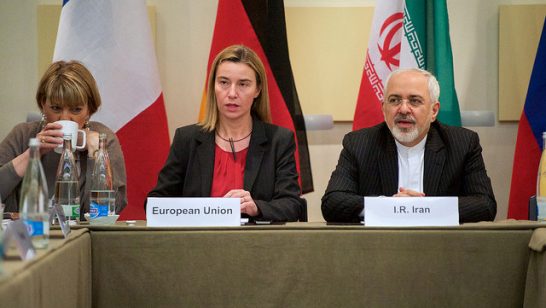
Iran’s withdrawal from the Joint Comprehensive Plan of Action (JCPOA) —irrespective of its continued adherence to the Nuclear Non-Proliferation Treaty —would result in an instant deterioration of the regional security environment, involving a high probability of a conventional war and the possible nuclearisation of Saudi Arabia. In this foresight study, three possible scenarios and repercussions for Iranian non-compliance with either the terms of the JCPOA or NPT are examined. Its purpose is to highlight likely outcomes and triggers for potential future crises, and to help find workable solutions in the real-term.
The paper considers three plausible choices for Iran:
- Scenario 1. Iran withdraws from both the JCPOA and the NPT, and openly seeks nuclear weapons. Tehran’s decision shocks and unites the international community, and some states (Israel, Saudi Arabia, the United States) feel compelled to undertake military action. Iran retaliates. Regional war ensues.
- Scenario 2. Iran withdraws from the JCPOA and nominally continues adhering to the NPT, with a threshold nuclear programme. Tehran insists it is abiding by NPT obligations; the resumption of nuclear activities beyond JCPOA limits fuels suspicions that Tehran is seeking nuclear weapons. The uncertainty divides the international community, with some states opting for “pre-emptive” limited strikes.
- Scenario 3. Iran continues adhering to the JCPOA and the NPT. The E3/EU persuade Iran that the JCPOA serves its security and economic interests better than any alternative. Although Washington does not return to the deal, Europeans and other supporters make additional benefits available to Iran, giving the government enough benefit to continue compliance with its obligations.
Scenario Three, however, requires Europeans and the wider international community to redouble engagement efforts and urge Iran to avoid risk-taking on the JCPOA. It is clear that without the Deal’s constraints, aspects of the international community—particularly regional actors such as Israel and Saudi Arabia—are likely to harbour deep concerns over Iran’s nuclear activities. At worst, this could lead to engagement in military action.
This study offers specific recommendations that can allow the E3/EU to react early and prevent negative scenarios from materializing. Including
- Redoubling efforts to provide economic benefit to Iran without jeopardising EU business interests, noting economic failure may result in loss of governmental support
- Exploring ways to maintain the JCPOA with Russia and China
- Beyond practical measures, leveraging symbolism (such as high-profile visits or partnership declarations) with Tehran to ensure continued compliance
- Engaging regional states, such as Saudi Arabia, Bahrain, and the UAE, in confidence building measures concerning their regional security challenges
- Continuing to highlight the consequences of potential regime change in the face of continued ‘maximum pressure’
- Stressing the importance of the global non-proliferation regime
The opinions articulated above also do not necessarily reflect the position of the European Leadership Network or any of its members. The ELN’s aim is to encourage debates that will help develop Europe’s capacity to address pressing foreign, defence, and security challenge.



